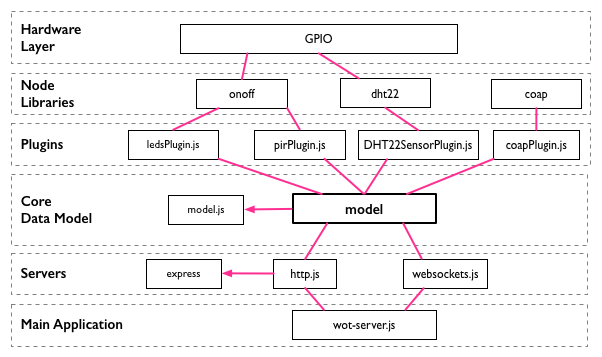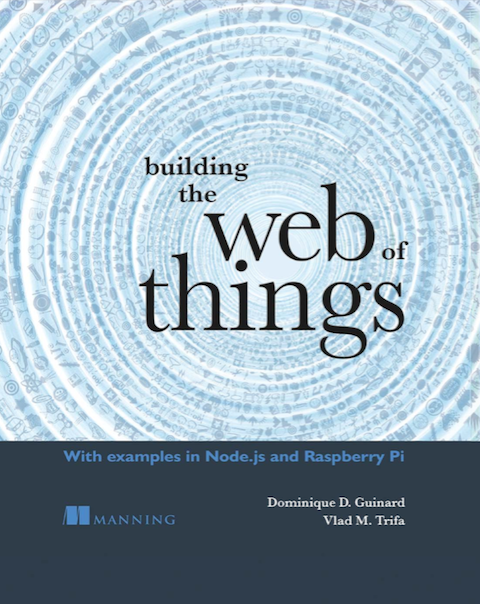webofthings
v0.1.0
Published
A Node.js Web of Things server and gateway for Linux based devices such as the Raspberry Pi, Beaglebone, Edison or Samsung Artik
Downloads
7
Maintainers
Readme
Node.js Web of Things Server
A server and gateway reference implementation of the W3C Web Thing Model, written in Node.js and tailored for embedded systems.
What is the Web Thing Model?
It's a simple model for Things to interact together and with app via the Web. Read more about it in a blogpost or even more in a webinar!
What is webofthings.js?
A simple, lightweight, and extensible implementation of the W3C Web of Things Model. in Node.js. It not (yet) a bomb proof gateway but a way to experiment with the Web of Things and the basis of the Building the Web of Things book where you'll learn how the framework works, how to deploy it on a Raspberry Pi and how to use it to serve Web access to sensors and actuators.
What does this do?
First, it implements a Web of Things server that you can run on any platform that supports Node and in particular on many embedded devices. Second, it exposes the services and function of your service over HTTP and WebSockets.
What devices does it support?
Any Windows or *Nix device really but if you want to use the GPIOs you will need an embedded device. The framework was tested on the Raspberry Pi (A, B, B+, Zero and 2) and the Beaglebone Black. Most of the code also works on the Intel Edison.
How is it built?

How do I start it?
Install it: npm install webofthings
Run it: node wot.js or sudo node wot.js if you plan to use the temperature and humidity plugins.
How do I configure it?
The WoT gateway can be tweaked by changing the configuration parameters in /resources/piNoLd.json.
The following parameters are available:
"customFields": {
"hostname":"localhost",
"port": 8484,
"secure": true, // true means the gateway will require HTTPS and an API key
"dataArraySize" : 30 // size of the Properties and Actions arrays.
},If you use it in a serious environment make sure you:
- Generate/buy your own TLS certificates to replace the public certificate and private key in
/resources. - Make sure you generate a new API token to replace the default one (
cKXRTaRylYWQiF3MICaKndG4WJMcVLFz) in/resources/auth.json, you can use theutils.generateApiToken()function to generate a new one.
How do I extend it?
The WoT Gateway framework comes with three internal plugins to connect it to sensors and actuators:
dht22Plugin.jsto connect a temperature and humidity sensorledsPlugin.jsto connect it to LEDspirPlugin.jsto connect it to a passive infrared sensor
but it can easily be extended by adding internal or external plugins (i.e., to serve the resources
of other devices via a Web API) extending corePlugin.js.
How do I run the tests?
- Install mocha
npm install -g mocha - Run the tests
mocha
How do I learn more about the Web of Things?
Browse http://webofthings.org and/or buy the Building the Web of Things Book


